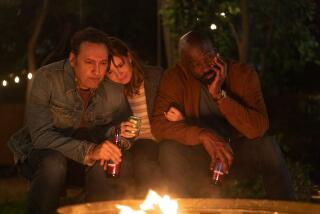âArrowâ kills off a character with a well-placed gut-punch to the soul
You donât know what you got ... âtil itâs gone.
I have never been a fan of Laurel Lance. Actually, thatâs too kind, Iâve been an avowed enemy of the character during âArrowâsâ four-season run. I complained that she was selfish and irritating, often criticizing her as an unnecessary part of Team Arrowâs dynamic, a hindrance to the groupâs otherwise Scooby Gang-like harmony.
Iâm certainly not the lone âArrowâ fan with a distaste for the TV iteration of Black Canary, but Iâve never been great at justifying it. Did Black Canary grate personally due to her dissenter voice on the team? Her occasional nudging of Oliver to kill when a situation arguably called for death? Her weakness in combat, when compared to the capes and cowls around her?
Was I unknowingly giving her the Skyler White treatment, vilifying a female character who was often morally right, simply because she often challenged the male lead?
When the CW confirmed a character would be killed off in Wednesday nightâs âEleven Fifty-Nine,â promising to reveal the person occupying the grave in those flash-forward scenes, I scoffed at the idea it would be Laurel. There was simply no way her death would resonate with the fans, least of all me.
But as Oliver Queen carried a mortally wounded Laurel through a hospital, I found myself praying she would somehow survive. When her prognosis improved, I was shocked at my level of relief that this character Iâd never loved would still be around in the weeks to come.
And when she died, slipping away after a tearful goodbye to the showâs titular hero, it felt like Darhk had driven that arrow through me instead of her.
Laurelâs death is the engine that drives âEleven Fifty-Nine,â a gut punch of an âArrowâ episode that plays off a number of emotional conflicts that seemed to have gotten lost in a busy season. Thea and Merlynâs rivalry plays out as a showdown between two samurai who canât kill each other even while they murder the last vestiges of their father-daughter relationship. Andyâs final betrayal of Diggle, while inevitable, is still brutal as it leaves John partially to blame for Laurelâs death.
And whether itâs a function of the episodeâs wonderful structure or the guilt Iâm feeling over loathing Laurel for what may have been the wrong reasons, her death is an absolute emotional haymaker.
Laurelâs death was heavily foreshadowed throughout the episode, from the diner scene where Quentin finally accepts her decision to become the Canary, to her âIâm totally not about to die,â pronouncement that sheâll suit up one last time to deal with Darhkâs prison break.
That foreshadowing left me white-knuckled throughout the back half of the episode. Laurelâs death seemed inevitable, so I found myself gritting my teeth hoping sheâd somehow survive the prison brawl. Even when Darhk tossed half the team into a wall and snatched Oliverâs arrow out of the air, and began his menacing stroll toward a paralyzed Laurel (Neal McDonough has mastered the art of the âyou are screwedâ slow walk), I was trying to imagine a scenario where someone else died.
To have Laurel survive just long enough to die in the episodeâs closing sequence (leaving me slightly confused as to how a stab wound produces fatal seizures) was just needlessly cruel.
âEleven Fifty-Nineâ doesnât absolve the storytelling sins of the entire season, of course. Darhkâs motives and plans are still basically a blank slate in the seasonâs final act, and Merlynâs decision to free the Darhk from prison makes little narrative sense. Yes, I know Darhk promised to spare Thea from âGenesisâ (this seasonâs annual threatened cataclysm), but what does Merlyn have to fear of that if Darhk is de-powered and locked up?
But those are nits to pick for another day. This episode is a marvelous sendoff for Laurel, a character I fear I misunderstood on some levels until it was too late. I maintain some of my complaints from the past: the addiction storyline was a dud and her obliviousness to the consequences of Saraâs ressurrection remain a prime example of smart characters being dumb in service to the plot.
But Laurel was a hero, one I never truly appreciated. She didnât learn to fight after years on an island training under Deathstroke, and she wasnât atoning for a life previously misspent. Sheâs not a soldier like Diggle. She has no powers like Vixen, no suit of armor like Ray Palmer.
She simply saw her city going to hell, watched her sister die and decided to do something about it. With the exception of the Canary Cry, Laurel went into fight after fight woefully outmatched but with little regard for the consequences.
She may have been more relatable than I ever gave her credit for, a woman who stood up and did something at great personal risk when most others wouldnât. She voiced unpopular opinions. She fought, she lost, and she won me over in the process.
As hokey as that âone last timeâ scene might have been, itâs also maybe the briefest but most accurate assessment of the person Laurel Lance blossomed into. There she is, weighing a prime position as Star Cityâs district attorney, promised a fulfilling job that would give her a path out of vigilantism that the Queens and her sister always lacked.
But she suits up anyway, for what she hopes will be a final confrontation with Damien Darhk. And it is, just not in the way any of us would have hoped.
Goodbye Laurel Lance. Thanks for doing the things I wouldnât.
Left In The Quiver:
- The Lazarus Pit is gone, and if you believe Arrow Executive Producer Marc Guggenheim, Laurel Lanceâs death will be permanent. There wonât be any time travel/alternate reality fixes. But Katie Cassidy will still make occasional appearances in the Arrowverse. Sheâs set to appear as Black Siren whenever âThe Flashâ returns to the parallel universe of Earth-2 later in the season. P.S.: Flash writers, do not let Zoom kill her there as well.
- Speaking of Katie Cassidy ... well, damn. Those hospital scenes were powerful, especially her sobbing final pronouncement of love to Oliver. Maybe Iâm caught up in the moment a bit here, as I donât feel like the character was ever repressing feelings while Ollie and Felicity fell into domestic bliss, but that was a great piece of acting.
- Wise choice to keep Felicity off-camera except for a closing cameo. Her presence could have been distracting, and we didnât need any focus on the relationship melodrama here.
- There were flashback scenes ... I think stuff happened in them? The visits to the past seemed even more pointless than usual in contrast to the action in the present-day. Can we just get some exposition on the exact way Darhkâs idol works and be done with it already?
- Poor Diggle. He is never, ever going to forgive himself for this. There absolutely needs to be a vicious, âDaredevilâ-style punch-up between the brothers Diggle before this season is over. Sign me up for that fight scene.
- When did Malcolm Merlyn get a prosthetic hand? Oliverâs maiming of his former nemesis and the dissolution of the League were such a big moment in the season, so it seems a little weird that we werenât given the slightest hint as to how Merlyn recovered so quickly, or was still able to wield a sword so expertly after being mutilated.
- Watching Thea shoot Darhk in the chest right before he started hurting her friends felt like a true comic book moment, one of those scenes where you turn to the next panel and the hero swashbuckles in to save the day. Well done.
- Really nice touch having Darhk finish off Laurel with Oliverâs own weapon. Reminded me of the end of Kevin Smithâs âGuardian Devil,â in which Bullseye brings one of Matt Murdockâs love interests to a particularly moritfying end.
Follow @JamesQueallyLAT if you like watching a grown man mourn fictional characters, for more reversals of opinion about âArrowâ and âDaredevilâ (with the exception of Karen Page: Citizen Journalist, because, ew) and for crime and police news in the real world.
More to Read
The biggest entertainment stories
Get our big stories about Hollywood, film, television, music, arts, culture and more right in your inbox as soon as they publish.
You may occasionally receive promotional content from the Los Angeles Times.











